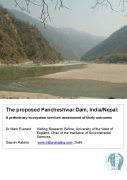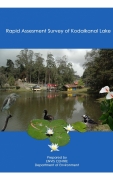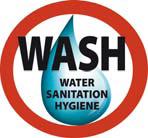/topics/voluntary-citizen-or-civil-society-sector
Voluntary Citizen or Civil Society Sector
Deaths due to water pollution
Posted on 02 Aug, 2010 02:38 PMDeaths due to water pollution occur mainly as a consequence of drinking of contaminated water. The common diseases caused by consumption of contaminated water are Cholera, Viral Hepatitis, Enteric Fever (Typhoid) and Acute Diarrhoeal Diseases (ADD).
The number of deaths reported State-wise on account of Cholera, Viral Hepatitis, Enteric Fever (Typhoid) and Acute Diarrhoeal Diseases (ADD) for the years 2007, 2008 and 2009 are given in Annexure – I-III.
India WASH forum e-newsletter - Update 13 July 2010
Posted on 02 Aug, 2010 11:56 AMWe see this newsletter as a platform for independent credible voice in the water and sanitation sector. Our emphasis is on bringing together critical news and information with analysis. In this issue we share news and analysis on topical issues and developments.
The Department of Drinking Water and Sanitation(DDWS) has simultaneously invited inputs to Discussion Papers on Drinking Water and Sanitation, circulated on Solution Exchange. Inputs given by India WASH Forum, on this, is enclosed in this Update. We have pointed out the missing elements of sanitation improvement strategy that include, criticality of providing water as an inseparable component to household sanitation, the tendency to see behavior change as a lifestyle issue and not linked to the hardware components, peoples livelihoods and living conditions. Suggestions for what needs to be done to strengthen the implementation mechanism of the flagship sanitation programme(TSC) and partnerships.
A preliminary ecosystem services assessment of likely outcomes of the proposed Pancheshwar dam in India/Nepal - An IES report (2010)
Posted on 02 Aug, 2010 02:24 AM This report by the IES presents the findings of a study that explores the likely impacts of the recent proposals in India to build a dam at Pancheshwar in the Himalayas on the river ecosystems and the surrounding areas and people involved. This dam will be the world's second tallest structure intended to harness hydroelectric power and water by controlling the flow of the Kali river and its tributaries.
This report by the IES presents the findings of a study that explores the likely impacts of the recent proposals in India to build a dam at Pancheshwar in the Himalayas on the river ecosystems and the surrounding areas and people involved. This dam will be the world's second tallest structure intended to harness hydroelectric power and water by controlling the flow of the Kali river and its tributaries.
The document argues that although there are many benefits of the dam in terms of energy and water, the wider ramifications of the dam and its consequences for the people staying around the area have not been thought about in the planning process. The planning process has not engaged local people in the decision-making process, there is paucity of published information and the environmental and social consequences have been considered belatedly in the planning process.
Rapid assessment survey of Kodaikanal lake - ENVIS Centre (TN) (2009)
Posted on 02 Aug, 2010 02:02 AM This document by the Department of Environment, Government of Tamil Nadu highlights the importance of the Kodaikanal lake as an important tourist destination and warns that this freshwater lake is under the threat of getting polluted and its biodiversity endangered.
This document by the Department of Environment, Government of Tamil Nadu highlights the importance of the Kodaikanal lake as an important tourist destination and warns that this freshwater lake is under the threat of getting polluted and its biodiversity endangered.
The document presents the findings of the study that aimed at assessing the physico-chemical and biological quality of the Kodaikanal lake.
Evidence indicates that unrestricted tourism activities have led to high use of plastic bottles, glass bottles, plastic bags, causing high levels of pollution and silting of the lake. Damaged fibreglass boats left inside the lakes also pose a serious threat to the lake ecosystem.
Climate change in India: Forgotten threats, forgotten opportunities - EPW paper
Posted on 02 Aug, 2010 01:12 AMThe document begins by commenting on the position taken by India in the global climate change discourse. India has consistently argued from the point of view of developing countries against restrictions on emissions that have been imposed on all countries globally, by stating that developing countries have started the industralisation processes recently and thus have contributed very little to the carbon emissions.
Thus, countries like India should not sacrifice their present development and growth for reducing global emissions. Any legitimate climate mitigation initiative should be just, equitable and secure developing countries' growth patterns.
The document argues that although India 's stand seems justifiable in the global discourse, the climate change issue is still a very sensitive one for India and India has the greatest to lose if it does not take proactive steps to deal with the issue of climate change in the future.
Salvaging and scapegoating: Slum evictions on Chennai’s waterways - EPW paper
Posted on 02 Aug, 2010 01:03 AMThe paper highlights the case of recent projects that have been planned on the river Cooum in Chennai.
Water sector and reforms - Report of workshop organised by CASUMM (2007)
Posted on 02 Aug, 2010 12:08 AMThe workshop was organised in response to the implementation of two water supply projects in Bangalore and Mysore as a part of the Water Sector Reforms under the Jawaharlal Nehru National Urban Renewal Mission (JNNURM) and the increasing trend of privatisation under the water sector reforms in cities like Bangalore and Mysore.
It was felt that there was a need to raise awareness among citizens and groups in Bangalore and Mysore regarding the implications of privatisation and the mechanisms through which privatisation was being introduced in the cities in India.
K-East Ward Mumbai Water Distribution Improvement Project (WDIP): FAQs compiled by CASUMM
Posted on 01 Aug, 2010 03:58 PMThis document by Collaborative for the Advancement of the Study of Urbanism through Mixed Media (CASUMM) provides details about the K-East Water Distribution Improvement Project (WDIP) started in Mumbai, in the form of FAQs.
It argues that the very way in which the project is being planned and implemented, indicates that the agenda of the donor organisations is to gradually push for the privatisation in the water sector.
Water distribution improvement "World Bank style" in K-East Ward Mumbai - A working paper by CASUMM
Posted on 01 Aug, 2010 03:43 PMIn this document by CASUMM, the author raises important questions regarding the recent trends towards privatisation of water supply in Indian cities by discussing the case of the water supply scheme project in the K-east ward of Mumbai.
The privatisation of the water supply scheme, which has been implemented through grants by the World Bank (WB) raises serious questions regarding the intentions of the international organisations that fail to take into consideration the local context and the needs of the people and focus exclusively on profit making.
Water challenges in Greater Bangalore - NIAS-CASUMM workshop note (2007)
Posted on 01 Aug, 2010 03:36 PMThis document provides the background for a workshop on 'Water Challenges in Greater Bangalore', organised by NIAS and CASSUM at the National Institute of Advanced Studies (NIAS), Indian Institute of Science (IISC) campus on March 27, 2007.
The document highlights the current scenario of privatisation of water services that are being funded by international financial institutions under the water sector reforms in the city of Bangalore, which have had a very negative impact on the urban poor, who continue to face the problem of inadequate, unreliable and unsafe water supply as compared to other posh and water rich areas in the city.






